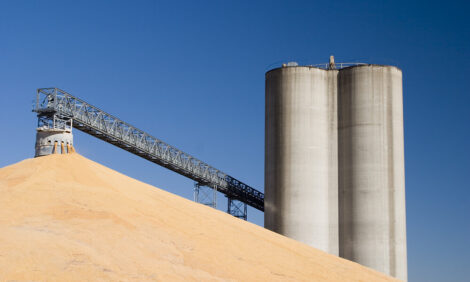



Probiotics for Pigs: Less Manure, Better Health
US - Pig producers would like to keep their costs down by supplementing livestock feed with dried distiller’s grains with solubles (DDGS) and other agricultural co-products generated from biofuel production. But adding hard-to-digest fibre to livestock diets also increases the production of manure - never a good thing, especially when it threatens to exceed on-farm storage capacities.So Agricultural Research Service microbiologist Cherie Ziemer and others conducted the first published investigation of using bacteria as a probiotic to increase fibre fermentation rates and reduce manure output in pigs consuming high-fibre diets.
A high-fibre diet can also serve as a source of energy if the fibre can be broken down during digestion. Other researchers have investigated using carbohydrase enzyme supplements to break down dietary fibre and release sugars that can then be absorbed in the small intestine. Bacterial fermentation of these same fibres, on the other hand, takes place in the large intestine and results in the production of small-chain fatty acids that pigs use to meet metabolic energy demands.
Ziemer and animal scientist Brian Kerr, who works with Ziemer in the ARS Agroecosystem Management Research Unit in Ames, Iowa, fed the pigs in their study either a typical diet or a high-fibre diet. The high-fibre diets contained 10 per cent soybean hulls and 20 per cent corn DDGS. The pigs were also given one of three bacterial supplements the scientists developed from different strains of Bacteroides ovatus, which had been obtained from human faecal samples and cultured in fibre-rich media. The three bacterial supplements were designated Bacterium B, C and D.
The pigs that consumed the fibre-rich diets and the three different probiotics had strikingly different levels of manure production. The pigs given Bacterium D produced about the same amount of manure daily as the pigs that did not receive a probiotic. The group given Bacterium C produced four per cent more manure than the probiotic-free group.
But pigs that received the bacterial supplement designated as Bacterium B reduced their manure output by 20 per cent. These pigs also gained more weight and had better blood cholesterol and glucose levels—both indications of an improved energy status—than pigs not given probiotics.
Ziemer believes the probiotic could improve pig performance and reduce manure volumes, which in turn would increase producer profits and reduce the environmental footprint of pork production. She thinks the bacterium could be fed in a liquid supplement or possibly freeze-dried and mixed with feed.
This work was supported by a grant from the Defense Advanced Research Projects Agency as part of the Intestinal Fortitude Program, which investigates how to help people obtain more energy from fibre.
Results were published in the Journal of Animal Science in 2012, and ARS has submitted a patent application for Bacterium B.
"Probiotics for Pigs: Less Manure, Better Health" was published in the March 2014 issue of Agricultural Research magazine








